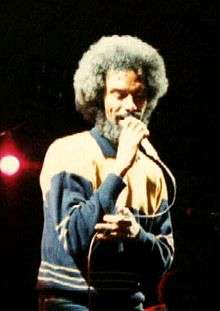Whitey on the Moon
"Whitey on the Moon" is a 1970 spoken word poem by Gil Scott-Heron. It was released as the ninth track on Scott-Heron's debut album Small Talk at 125th and Lenox. It tells of medical debt and poverty experienced during the Apollo Moon landings. The poem critiques the resources spent on the space program while Black Americans were experiencing marginalization. "Whitey on the Moon" was prominently featured in the 2018 biographical film about Neil Armstrong, First Man.
Background, recording, and content

Gil Scott-Heron stated that he was inspired to write "Whitey on the Moon" by a statement from writer and activist Eldridge Cleaver, who argued that the space program was distracting the US from internal problems.[1] Scott-Heron wrote the poem the summer before it was released. Scott-Heron's mother suggested the refrain and the closing line.[1]
"Whitey on the Moon" was released as the ninth track on Scott-Heron's 1970 debut album, Small Talk at 125th and Lenox.[2] Scott-Heron speaks the poem,[3] alongside a drum accompaniment, of a sort that was common in street poetry. It is just under two minutes long.[4] Though the album has been frequently described as being recorded live in a nightclub in New York City, it was in fact recorded in a studio, with an audience present to simulate a live crowd.[1] "Whitey on the Moon" narrates the story of Scott-Heron's "sister Nell", who is bitten by a rat while Neil Armstrong lands on the Moon. It then talks of medical debt that is incurred for her treatment, and rising costs of basic necessities as a result of the Moon landings. It ends with the sarcastic promise that when the next bills arrive, Scott-Heron would send them by "air mail special to Whitey on the moon".[4] The first lines of the poem run as follows:
A rat done bit my sister Nell.
(with Whitey on the moon)
Her face and arms began to swell.
(and Whitey's on the moon)
I can't pay no doctor bill.
(but Whitey's on the moon)
Ten years from now I'll be paying still.
(while Whitey's on the moon)[5]
Analysis, reception, and reuse
"Whitey on the Moon" has been described as exemplifying afrofuturism, or "Black social thought concerning 'culture, technology, and things to come'."[4] The poem critiques the US space program, by connecting its use of government funds to the marginalization of Black Americans.[4] The poem identifies neglect by the government as the reason for poverty, an argument also made by Marvin Gaye's 1971 song "Inner City Blues (Make Me Wanna Holler)",[4] and questioned who benefited from the space program.[6][7] The connection that Scott-Heron implies between capitalism in the US and poverty, environmental destruction, and militarism were themes that were found in many other of his works.[4] During the 1970s, the view that the country was spending too much on its space program was widespread in the US, and was shared by politicians including President Richard Nixon.[6][8] This criticism of the space program has been described as reaching its epitome in "Whitey on the Moon".[7]
Writing for The Atlantic after Scott-Heron's death in 2011, Alexis Madrigal stated that "Whitey on the Moon" had taken spaceflight out of the "abstract, universal realm in which we like to place our technical achievements". Madrigal added that the poem raised questions about "which America" got the "glory of the moon landing", and of what the costs of putting "whitey on the moon" were.[9] A 2014 biography of Scott-Heron described "Whitey on the Moon" as a "gem of a prose poem" that was well-received critically, and that it was a strong counterpoint to "reverent coverage" of the Moon landings.[1]
The 2018 film First Man, a biographical film about Neil Armstrong, prominently features "Whitey on the Moon". Director Damien Chazelle and writer Josh Singer sought to portray the "passionate feelings" of those opposed to the cost of the program: Singer stated he was interested in "pulling the veneer off" of what had been a "pretty sugarcoated story".[6] In the film, the poem is read over footage of the Apollo 1 disaster and of people protesting the space program.[6] It was performed by Leon Bridges, and included on the movie's soundtrack album.[10]
References
- Baram, Marcus (2014). Gil Scott-Heron: Pieces of a Man. St. Martin's Publishing Group. pp. 72–75. ISBN 978-1-250-01279-1.
- Bush, John. "Gil Scott-Heron Small Talk at 125th and Lenox". AllMusic. Retrieved June 4, 2020.
- "Gil Scott-Heron Whitey on the Moon". AllMusic. Retrieved June 4, 2020.
- Loyd, Jenna M. (2015). "'Whitey on the Moon': Space, Race, and the Crisis of Black Mobility". In Montegary, Liz; White, Melissa Autumn (eds.). Mobile Desires: The Politics and Erotics of Mobility Justice. Palgrave Macmillan. pp. 41–52. (subscription required)
- Chiroux, Matthis (March 11, 2012). "Whitey on the Moon, Again?". Huffington Post. Retrieved June 4, 2020.
- Rao, Sonia (October 13, 2018). "Why 'First Man' prominently features Gil Scott-Heron's spoken-word poem 'Whitey on the Moon'". The Washington Post. Retrieved June 4, 2020.
- Frédéric Regard (2015). Arctic Exploration in the Nineteenth Century: Discovering the Northwest Passage. Routledge. pp. 11–12. ISBN 978-1-317-32152-1.
- Arlin Crotts (2014). The New Moon: Water, Exploration, and Future Habitation. Cambridge University Press. pp. 71–72. ISBN 978-0-521-76224-3.
- Madrigal, Alexis C. (May 28, 2011). "Gil Scott-Heron's Poem, 'Whitey on the Moon'". The Atlantic. Retrieved June 4, 2020.
- Holmes, Linda (October 11, 2018). "First Man Considers Glory, Grief And A Famous Walk On The Moon"". National Public Radio. Retrieved June 5, 2020.